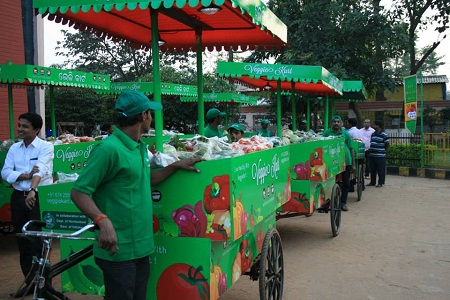Farm to Family (and, Hopefully, Health and Wealth): Produce distribution model in India builds in economic empowerment
When you think about efforts to improve global health, your mind is likely to turn to medical interventions: vaccines, health worker training, supplies, health infrastructure improvements and the like. But ensuring the health and well-being for low-income and vulnerable communities throughout the world often requires much more.
In India, “much more” comes in many forms. But for the social enterprise eKutir and its VeggieKart initiative, “much more” means agriculture and nutrition, and it means filling gaps in the value chain so farmers and consumers alike can share in healthier, more productive livelihoods.
VeggieKart is an e-commerce platform that connects farmers in Odisha, India, with families throughout the state through a creative distribution model that enables micro-entrepreneurship at each stage of the process. Its model is built to respond to Odisha’s fragmented value chain for agriculture, where farmers in rural villages are disconnected from consumers and often exploited by “middle men” who set prices and control the market.
As eKutir Chief Operating Officer Suvankar Mishra notes, “More than 90 percent of Odisha’s vegetable growers are small, marginal and landless with little to no access to market infrastructure and intelligence. And more than 80 percent are women. For these reasons, ‘middle men’ take control of the value chain, increasing costs and regularly wasting or damaging the produce before they resell it to retailers.”
VeggieKart strives to overcome these challenges by taking over the role of intermediary agent to ensure fairness in price and opportunity at both ends of the value chain while creating business opportunities in between. Here’s how it works:
 (VeggieKart counts on a network of micro-entrepreneurs, including pushcart vendors known as VeggieWheels, left.)
(VeggieKart counts on a network of micro-entrepreneurs, including pushcart vendors known as VeggieWheels, left.)
First, VeggieKart procures fruits and vegetables directly from rural farmers, ensuring both financially sustainable pricing and freshness of the produce. It then posts the new supply of produce to its e-commerce platform along with key nutritional facts (aligned with the government of Odisha’s nutritional standards). From there, it activates its network of micro-entrepreneurs through two systems: VeggieMart – brick and mortar retail shops established in communities throughout the state; and VeggieWheels – pushcart vendors who sell branded, pre-packaged produce throughout their communities. The result is an informed consumption of fresh fruits and vegetables all while “Veggie” entrepreneurs are able to earn a living.
But with only 5 percent of Odisha households owning a computer, according to the latest census, an e-commerce platform for fruits and vegetables is no way to improve the overall health of a population without the means to access it. That’s one reason Grand Challenges India – a new grant-making initiative led by the Bill & Melinda Gates Foundation and supported by the Indian Department of Biotechnology and the U.S. Agency for International Development – recently awarded VeggieKart seed funding to expand its VeggieLite program, which it is currently undertaking this month.
A complement to VeggieMart and VeggieWheels, VeggieLite specifically targets low-income households in Odisha’s urban slums. Thanks to a partnership with Wholesome Wave, VeggieLite aligns its produce with poor families’ purchasing power by providing subsidized vouchers to low-income households, also incentivizing healthy food choices. And since the majority of these families do not have access to the VeggieKart platform, VeggieLite uses fliers, radio messages and word-of-mouth campaigns to inform poor communities about the nutritional value of their fruits and vegetables.
Another partner, the McGill Centre for the Convergence of Health and Economics, has been brought on to evaluate the VeggieLite initiative from its launch, assessing a series of health and economic indicators to determine the efficacy of the model in improving outcomes for its consumers.
But if the outer layer of the VeggieLite apple (if you will) is improving health, its core is economic empowerment. Not only does the model make fresh produce more affordable for poor families, but it offers entrepreneurial opportunities for its vendors – most of whom are women. Dubbed “smallholder producers,” these women set up VeggieLite “hubs” in their communities to distribute the produce, creating a farm-to-family model with robust economic possibilities.
As Suvankar Mishra told me, “The bridge to sustainable livelihoods in Odisha requires a range of factors – from water and sanitation to technology and access to health care. But by enabling better nutrition, food on the plate of the household and economic empowerment, we build trust and credibility. This paves the foundation for that bridge.”
With little foot traffic thus far, the VeggieLite bridge has a long way to go before it’s shepherding families out of poverty. But with a stable model and the funding to test it out, it offers an innovative way of linking farmers to families in Odisha, and connecting both to better livelihoods along the way.
Adam Lewis is a senior associate at Rabin Martin, a global health strategy firm in New York.
- Categories
- Agriculture, Health Care
